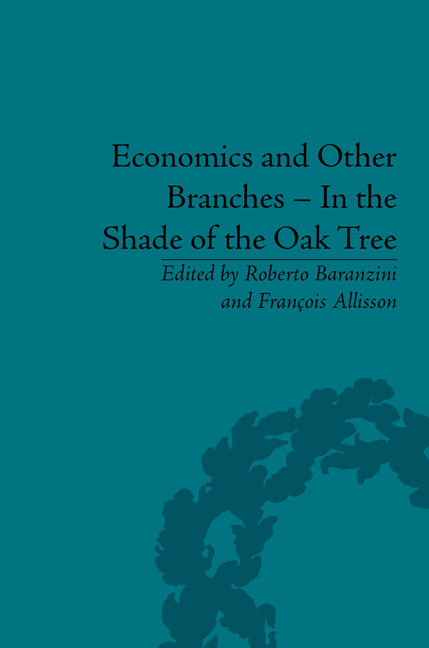Book contents
- Frontmatter
- CONTENTS
- List of Contributors
- List of Figures and Tables
- Introduction
- Pascal Bridel's Bibliography (up to 2013)
- Part I Léon Walras's Economic Thought
- Part II The Spreading of Thought
- Léon Walras's Reception
- The Lausanne School
- French Matters
- Cambridge UK
- Part III Monetary Theory
- Part IV Methodology
- Part V Economics and Humanities
- Economics and Social Sciences
- Some Insights from Visual Arts
- Part VI Economics and Civil Society
- 28 A Reflection on the Social Utility of Modern Macroeconomics
- 29 Failing to Control: Accountability in Historical Perspective
- 30 Does Transparency Engender the Confidence of the Governed? A Contribution to Political Thought
- 31 Face to the Environmental Challenge: Straddling the Fence between Social Responsibility and Penal Responsibility
- 32 Law as a System of Normative Production: Law and Semiotics
- Notes
- Index
28 - A Reflection on the Social Utility of Modern Macroeconomics
from Part VI - Economics and Civil Society
- Frontmatter
- CONTENTS
- List of Contributors
- List of Figures and Tables
- Introduction
- Pascal Bridel's Bibliography (up to 2013)
- Part I Léon Walras's Economic Thought
- Part II The Spreading of Thought
- Léon Walras's Reception
- The Lausanne School
- French Matters
- Cambridge UK
- Part III Monetary Theory
- Part IV Methodology
- Part V Economics and Humanities
- Economics and Social Sciences
- Some Insights from Visual Arts
- Part VI Economics and Civil Society
- 28 A Reflection on the Social Utility of Modern Macroeconomics
- 29 Failing to Control: Accountability in Historical Perspective
- 30 Does Transparency Engender the Confidence of the Governed? A Contribution to Political Thought
- 31 Face to the Environmental Challenge: Straddling the Fence between Social Responsibility and Penal Responsibility
- 32 Law as a System of Normative Production: Law and Semiotics
- Notes
- Index
Summary
Introduction
The question I wish to address in this essay surely makes sense in the context of the time we are living in. For the last four years our economies have been experiencing a deep recession, and, right or wrong, this experience has spilled over into the general judgement made about macroeconomics. In a nutshell, its reputation is at a low ebb. Is this judgement justified? On a broader level, what can civil society expect from macroeconomic theory? Is the discussion triggered by this last question ridden with ambiguities and misunderstandings, and, if yes, of which nature? These are the questions that I want tackle. To do the job, I shall follow a historical thread starting with the rise of macroeconomics to end up with real business cycle macroeconomics
The Rise of Macroeconomics
The sub-discipline of macroeconomics studies aggregate economic variables such as employment, output, the general price level, the interest rate, etc. It saw the light of day in the wake of World War II. Actually, it did not arise from scratch. Previously, it existed under the name of monetary theory, and its concern was the study of how money, in particular the supply of money, had an impact on ‘real’ economic outcomes as studied by pure economics.
The piece that, rightly enough, is considered its starting point is John Maynard Keynes's 1936 book, The General Theory of Employment, Money and Interest, in short the General Theory.
- Type
- Chapter
- Information
- Economics and Other Branches – In the Shade of the Oak TreeEssays in Honour of Pascal Bridel, pp. 397 - 412Publisher: Pickering & ChattoFirst published in: 2014



